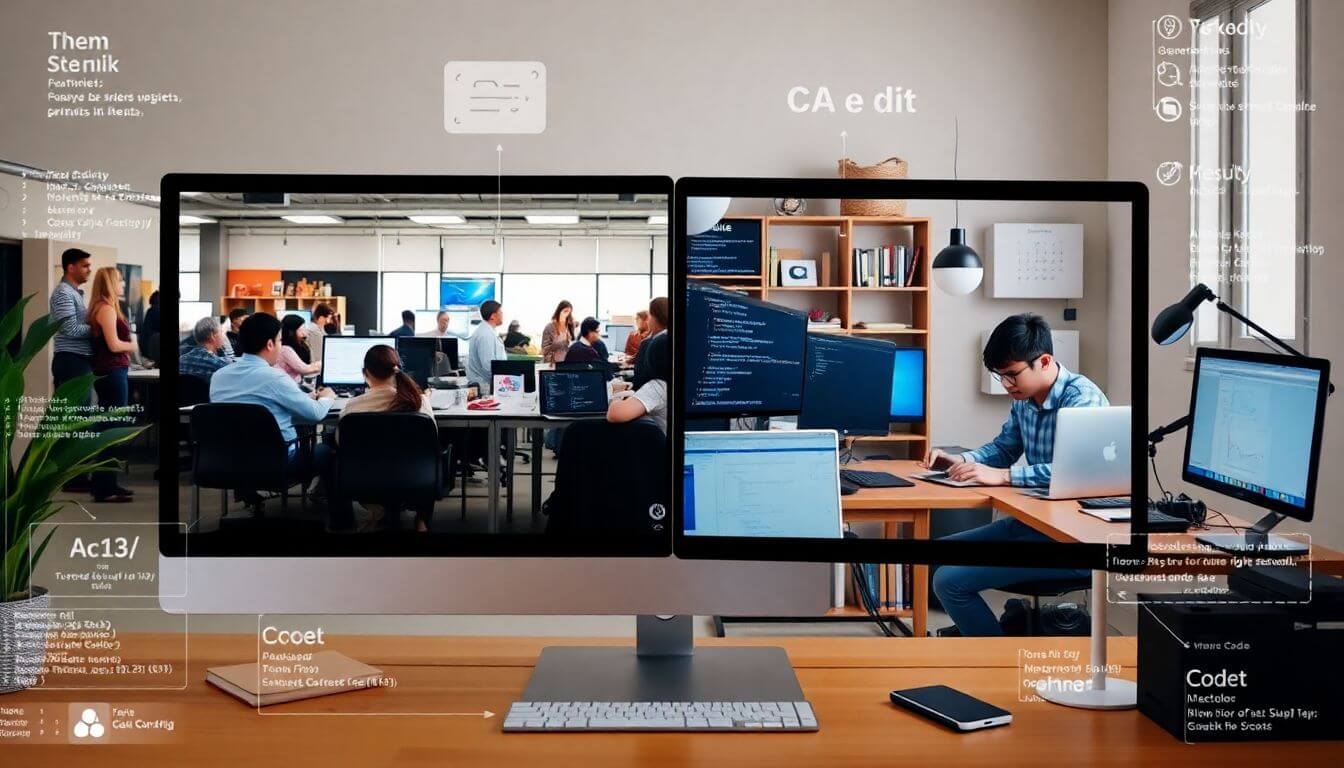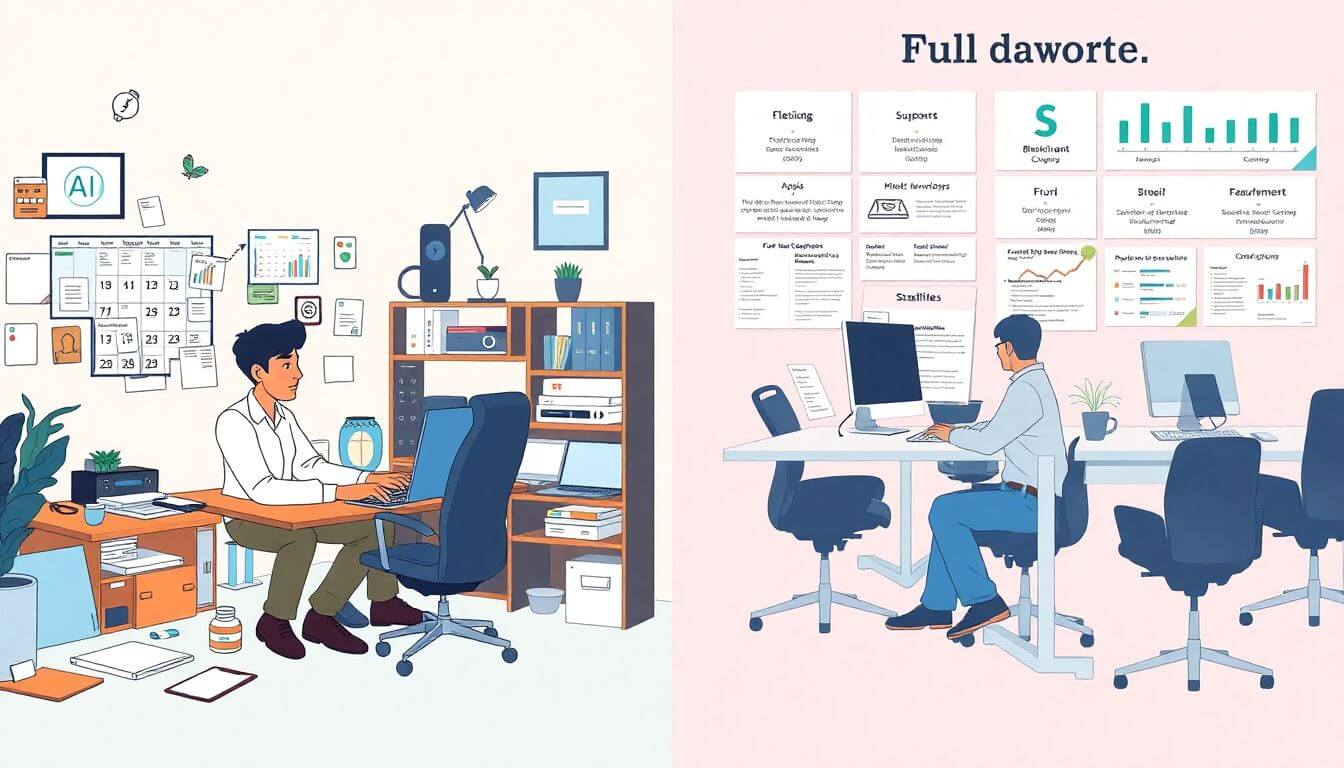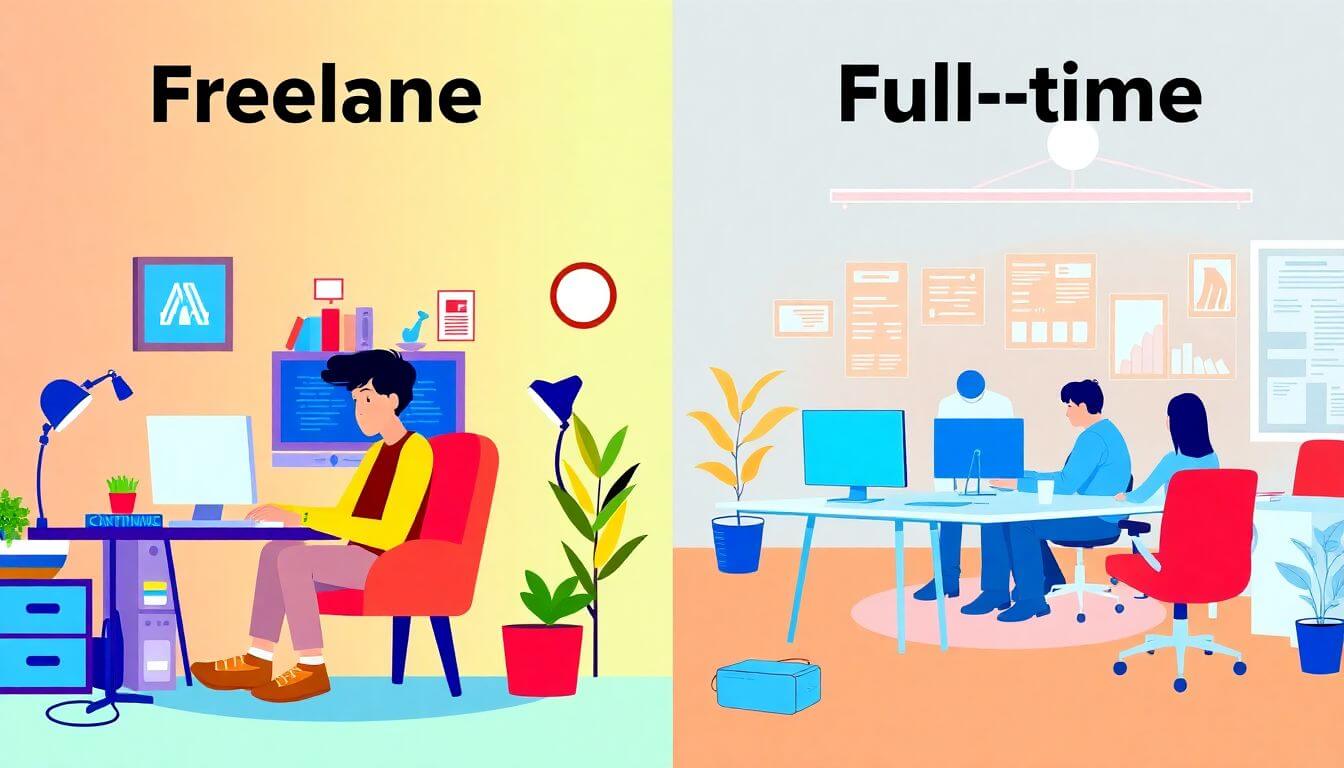Freelance Vs Full-Time Programming Jobs- Which Is Right For You?

Choosing between freelance programming and full-time employment as a developer can feel like standing at a career crossroads. Both paths come with their own sets of opportunities, challenges, and lifestyle implications. If you're a budding developer or someone considering a shift in your career, it's essential to understand what each option entails. This blog will give you a comprehensive breakdown of freelance and full-time programming jobs, helping you make an informed decision.
Freelance Programming Jobs

Freelancing in the programming world offers unmatched flexibility, independence, and opportunities to work with a variety of clients. However, it also comes with unique challenges that require a specific mindset and skill set.
1. Flexibility and Independence
As a freelance programmer, you have complete control over your schedule and projects. You choose which clients to work with, set your working hours, and decide where you want to work from—whether that’s a beachside café or your home office.
- Pros: Freedom to work at your own pace, pick projects you’re passionate about, and achieve a better work-life balance.
- Cons: It requires strong self-discipline to avoid procrastination and ensure consistent productivity.
2. Diverse Project Opportunities
Freelancers often get to work on a variety of projects across industries. This exposure helps them build a versatile skill set and expand their professional network.
- Example: You might develop a website for a retail client one month and work on an AI-driven chatbot for a healthcare startup the next.
- Advanced Tools: Leveraging platforms like Upwork or Toptal can connect you with high-quality clients, while tools like GitHub and JIRA streamline project management.
3. Earning Potential
Freelancing offers unlimited earning potential because your income is tied directly to your ability to market yourself and deliver results.
- According to freelance programming advice by Program Geeks, skilled freelance developers in fields like blockchain or AI can earn up to $150 per hour.
- Pro Tip: Focus on high-demand programming languages like Python, JavaScript, or Go to command better rates.
4. Challenges of Freelancing
Freelancing isn’t all roses. You need to handle client acquisition, taxes, contracts, and the uncertainty of irregular income.
- Tools like QuickBooks can simplify invoicing and financial management.
- Building a professional portfolio on platforms like LinkedIn and GitHub can enhance your visibility and credibility.
Full-Time Programming Jobs

Full-time employment as a programmer offers stability, benefits, and a clear career trajectory. However, it also means less flexibility and the need to adapt to corporate culture.
1. Job Security and Benefits
Full-time positions come with the comfort of a fixed salary, health insurance, retirement plans, and paid leave.
- Latest Trends: Companies are increasingly offering remote work options and flexible schedules to attract top programming talent.
- Full-time developer tips from Program Geeks suggest negotiating your salary and benefits to ensure you’re getting a fair package.
2. Specialized Skill Development
In a full-time role, you often specialize in specific technologies or areas, such as backend development, cybersecurity, or DevOps.
- Upskilling: Many companies offer employee training programs and pay for certifications like AWS or Google Cloud, allowing you to grow without bearing the costs.
- Example: As a full-time developer, you might become an expert in using Kubernetes for scalable cloud infrastructure.
3. Structured Career Growth
Full-time roles provide clear paths for promotions, performance reviews, and job stability.
- Insights: Career advice with Program Geeks emphasizes creating a long-term roadmap for your development, focusing on leadership skills and team collaboration.
- Key Consideration: Evaluate whether a company offers upward mobility before committing to a role.
4. Work-Life Balance
The 9-to-5 structure of full-time jobs can offer predictable routines, but it may lack the flexibility freelancers enjoy.
- Hybrid Work Models: Some companies now offer hybrid models, blending the benefits of in-office and remote work setups.
Comparing Freelance and Full-Time Programming Jobs

When deciding between freelance programming and a full-time role, understanding how these two career paths compare in essential areas is crucial. Let’s break down the critical factors that often influence career choices and examine them in depth.
1. Income Stability
Freelancers:
- Earning Variability: Freelance programming is known for its irregular income. One month might bring in multiple lucrative projects, while the next could be sparse. This uncertainty can be a significant drawback for those who prefer predictability.
- Earning Potential: Despite the variability, freelancers often have a higher earning potential. By choosing high-demand niches like AI, blockchain, or mobile app development, freelancers can charge premium rates. Platforms like Toptal and Fiverr Pro allow freelancers to connect with global clients willing to pay top dollar for expertise.
- Financial Management: Managing finances is a crucial skill for freelancers. Beyond earning money, they need to account for self-employment taxes, healthcare costs, and saving for retirement, which are typically covered by employers in full-time roles.
Full-Time Developers:
- Stable Income: Full-time developers enjoy consistent monthly paychecks, making financial planning and budgeting far easier.
- Additional Perks: Benefits like health insurance, paid time off, retirement plans (e.g., 401(k)), and bonuses add significant value to full-time roles. These perks reduce the financial burden on employees and provide a sense of security.
- Long-Term Earnings: While initial salaries for full-time positions might be modest compared to freelance rates, steady raises, promotions, and bonuses over time often lead to competitive total compensation.
Key Takeaway: If you thrive on stability and prefer predictable income, full-time roles may suit you better. If you can handle fluctuations and focus on scaling your business, freelancing offers greater earning potential.
2. Work-Life Balance
Freelancers:
- Flexibility as a Double-Edged Sword: Freelancers have the freedom to set their schedules. This means you can work during your most productive hours, take breaks as needed, or even travel while working. However, this flexibility can lead to blurred boundaries between work and personal life.
- Risk of Burnout: Overcommitting to too many clients or projects can result in long hours and missed deadlines, leading to burnout. The onus of managing time effectively rests entirely on the freelancer.
- Downtime Management: Unlike full-time employees, freelancers must actively decide when to take breaks or vacations. Since time off often means no income, freelancers may hesitate to unplug completely.
Full-Time Developers:
- Predictable Hours: Full-time roles typically adhere to a 9-to-5 schedule, which ensures a structured day. This predictability can help in maintaining a healthy work-life balance.
- Lack of Flexibility: However, the fixed nature of full-time work might limit your ability to attend to personal commitments during work hours.
- Workload Creep: In some cases, especially with remote work, full-time developers might experience unofficial overtime where boundaries between work and home blur.
Key Takeaway: Freelancing offers unparalleled flexibility but requires self-discipline to maintain balance. Full-time roles provide routine but may feel restrictive for those seeking more freedom.
3. Growth Opportunities
Freelancers:
- Diverse Skill Development: Freelancers often work on varied projects across industries, which helps them develop a wide range of technical and soft skills. For instance:
- A freelance programmer might shift from building an e-commerce website using Shopify one month to developing a machine-learning algorithm the next.
- They gain exposure to different tools, frameworks, and industries, enhancing their adaptability.
- Self-Driven Learning: Growth as a freelancer largely depends on your initiative. Freelancers must constantly upskill by taking online courses, attending webinars, or experimenting with new technologies.
Full-Time Developers:
- Specialized Growth: In a corporate setting, full-time developers often focus on a specific domain or technology stack. For example, a backend developer might specialize in cloud infrastructure using AWS over several years, becoming an expert in that niche.
- Structured Mentorship: Full-time roles often include access to mentorship programs, knowledge-sharing sessions, and on-the-job training. Companies may sponsor certifications, further fueling professional growth.
- Career Ladder: Clear hierarchies in organizations provide opportunities for promotions, enabling developers to transition from junior roles to senior positions or even leadership roles over time.
Key Takeaway: Freelancers gain breadth in their skills, while full-time roles offer depth. If you love variety, freelancing is your best bet. If you want to become an expert in a niche, a full-time job is ideal.
4. Networking
Freelancers:
- Active Networking Required: Networking for freelancers is an ongoing effort. To find clients and collaborators, freelancers must:
- Build an impressive online portfolio on platforms like GitHub or personal websites.
- Engage in social media marketing, particularly on platforms like LinkedIn and Twitter.
- Attend developer meetups, hackathons, and tech conferences to build relationships and gain exposure.
- Word of Mouth: For freelancers, delivering excellent work is critical because satisfied clients often refer new opportunities. This makes reputation a cornerstone of their networking strategy.
Full-Time Developers:
- Built-In Networking: Full-time roles naturally create networking opportunities. Working in teams or cross-departmental collaborations introduces developers to a broad set of professionals.
- Professional Ecosystem: Many companies encourage employees to participate in conferences, certifications, and events, further expanding their network.
- Internal Growth: Relationships within the organization can lead to internal promotions, mentorship opportunities, and knowledge-sharing.
Key Takeaway: Freelancers must proactively build and maintain a network, while full-time developers benefit from built-in networking opportunities provided by their organizations.
Choosing the Right Path for You

When deciding between freelancing and full-time programming roles, the ultimate choice hinges on your personal goals, financial requirements, and preferred work style. Here’s a detailed exploration to help you identify which path aligns best with your aspirations.
1. Who Should Freelance?
Freelancing is a fantastic option for individuals who prioritize freedom, enjoy variety in their work, and are willing to take on the responsibilities that come with running their own business.
-
Flexibility and Independence: If you’re someone who values control over your schedule, freelancing is an excellent choice. You can decide when to work, where to work, and how much to work. This flexibility is particularly appealing for those who want to travel, pursue personal projects, or balance work with other commitments.
- Example: A freelancer might choose to work intensively for a few months, earn a substantial amount, and then take an extended break to recharge or travel.
-
Self-Discipline and Business Management: Freelancing requires a high level of self-discipline and the ability to manage multiple aspects of your work. Beyond coding, you’ll need to handle:
- Client acquisition: Pitching your services and negotiating contracts.
- Project management: Delivering work on time while meeting quality standards.
- Finances: Managing invoices, taxes, and savings for periods of low income.
-
Irregular Income and Diverse Projects: Freelancers must be comfortable with income fluctuations. However, this unpredictability comes with the opportunity to work on diverse projects across industries, which can be creatively fulfilling and professionally enriching.
- For example, freelance programmers might transition from developing a mobile app for a fitness startup to creating a custom CRM system for a logistics company. This variety helps freelancers broaden their expertise and keep their work exciting.
Key Traits for Success: Freelancers thrive on independence, are self-motivated, and enjoy navigating the challenges of running their own business.
2. Who Should Go Full-Time?
Full-time roles are better suited for those who prefer a stable, structured environment and are looking for clear career progression within an organization.
-
Job Stability and Structured Career Growth: Full-time positions provide a stable income and additional benefits like health insurance, retirement plans, and paid leave. If financial security is a priority, full-time roles offer a dependable foundation.
- Example: A full-time developer can rely on a consistent paycheck, which simplifies budgeting for major life events like buying a house or saving for retirement.
-
Access to Mentorship and Resources: Full-time developers often benefit from mentorship programs, training resources, and certifications funded by their employers. This structured support system can accelerate learning and career growth.
- For instance, companies might sponsor certifications in cutting-edge technologies like AWS, Kubernetes, or AI/ML frameworks, providing employees with the tools to stay competitive in the job market.
-
Collaborative Team Environment: Working full-time means being part of a team, which can be rewarding for those who thrive in collaborative settings. Team projects foster opportunities for:
- Peer learning: Sharing knowledge and best practices.
- Networking: Building professional relationships within the organization.
- Leadership development: Transitioning into roles like team lead or project manager as part of a structured career path.
Key Traits for Success: Full-time developers are team-oriented, value stability, and seek a clear growth trajectory within an organization.
3. Combining Both: The Hybrid Model
If you’re torn between freelancing and full-time work, there’s no rule that says you must choose one exclusively. The hybrid model allows you to enjoy the best of both worlds, offering stability while also exploring the flexibility of freelance work.
-
Starting with Full-Time Employment:
- Many professionals begin their careers with a full-time role to gain experience, establish a steady income, and build a professional network.
- This initial stability helps in learning industry standards, mastering in-demand technologies, and developing confidence in their abilities.
- Over time, they may transition into freelancing as they accumulate expertise and build a reputation.
-
Freelancing as a Side Hustle:
- Some developers maintain their full-time roles while taking on freelance projects during weekends or evenings. This approach provides:
- Extra income to fund personal goals or savings.
- An opportunity to explore diverse projects beyond the scope of their day job.
- A smoother transition into full-time freelancing if they decide to make the switch eventually.
- Some developers maintain their full-time roles while taking on freelance projects during weekends or evenings. This approach provides:
-
Balancing Work-Life Priorities:
- The hybrid model also works for those who enjoy the security of full-time employment but want the creative freedom and financial perks of freelancing. It’s about finding the right balance that suits your lifestyle.
How to Decide Which Path to Choose
To make the best decision, reflect on the following:
- Financial Needs: Can you manage the income fluctuations of freelancing, or do you prefer the stability of a monthly paycheck?
- Career Goals: Do you want to specialize deeply in a specific area (full-time) or explore a variety of fields and projects (freelancing)?
- Work Style: Are you self-disciplined enough to manage your own time and projects, or do you thrive in a structured environment with clear goals and deadlines?
- Lifestyle Preferences: Do you value flexibility above all, or does the predictability of a full-time job suit you better?
How Prateeksha Web Design Can Help

No matter which path you choose, Prateeksha Web Design is here to support you. As a leader in creating responsive, SEO-friendly websites, we offer comprehensive solutions for freelancers looking to showcase their portfolios and businesses aiming to scale. With our expertise, you can:
- Build a stunning online presence that attracts clients.
- Optimize your website for better SEO rankings. For more tips on improving your online presence, visit HubSpot's SEO blog.
- Leverage cutting-edge tools to streamline your online operations.
Conclusion

The choice between freelance and full-time programming isn’t just about income or job stability; it’s about finding a path that aligns with your values, goals, and lifestyle. Whether you opt for the freedom of freelancing or the stability of a full-time role, the tech industry is full of opportunities for growth and innovation. And when it comes to building your professional presence online, Prateeksha Web Design is your trusted partner.
About Prateeksha Web Design
Prateeksha Web Design offers both freelance and full-time programming job opportunities. Freelance positions offer flexibility and the ability to work on various projects, while full-time positions provide stability and benefits. Depending on your preferences for work-life balance and career growth, Prateeksha Web Design can help you determine which option is right for you.
Interested in learning more? Contact us today. Explore more about the field by visiting Stack Overflow Jobs.
FAQs
FAQs
-
What are the main advantages of freelance programming over full-time employment? Freelance programming offers flexibility, independence, and the opportunity to work on diverse projects across different industries. Freelancers can set their own hours, choose their clients, and enjoy a better work-life balance.
-
What are some challenges freelancers face that full-time employees may not? Freelancers often deal with client acquisition, irregular income, and managing their own taxes and contracts, which can add stress. They also lack the structured support and benefits that full-time positions typically provide, such as health insurance and retirement plans.
-
How does the earning potential compare between freelance programmers and full-time developers? Freelance programmers can potentially earn more per hour than full-time developers, especially in high-demand fields. However, their income can be inconsistent, whereas full-time developers receive a steady paycheck along with added benefits.
-
Can I combine freelance work with a full-time job? Yes, many developers choose a hybrid model by maintaining a full-time job while taking on freelance work during their spare time. This approach allows them to build experience, a client base, and extra income without sacrificing financial stability.
-
What factors should I consider when choosing between freelance and full-time programming careers? Consider your financial needs, career goals, preferred work style, and lifestyle preferences. Determine whether you prioritize flexibility and variety or stability and structured growth in your professional journey.
